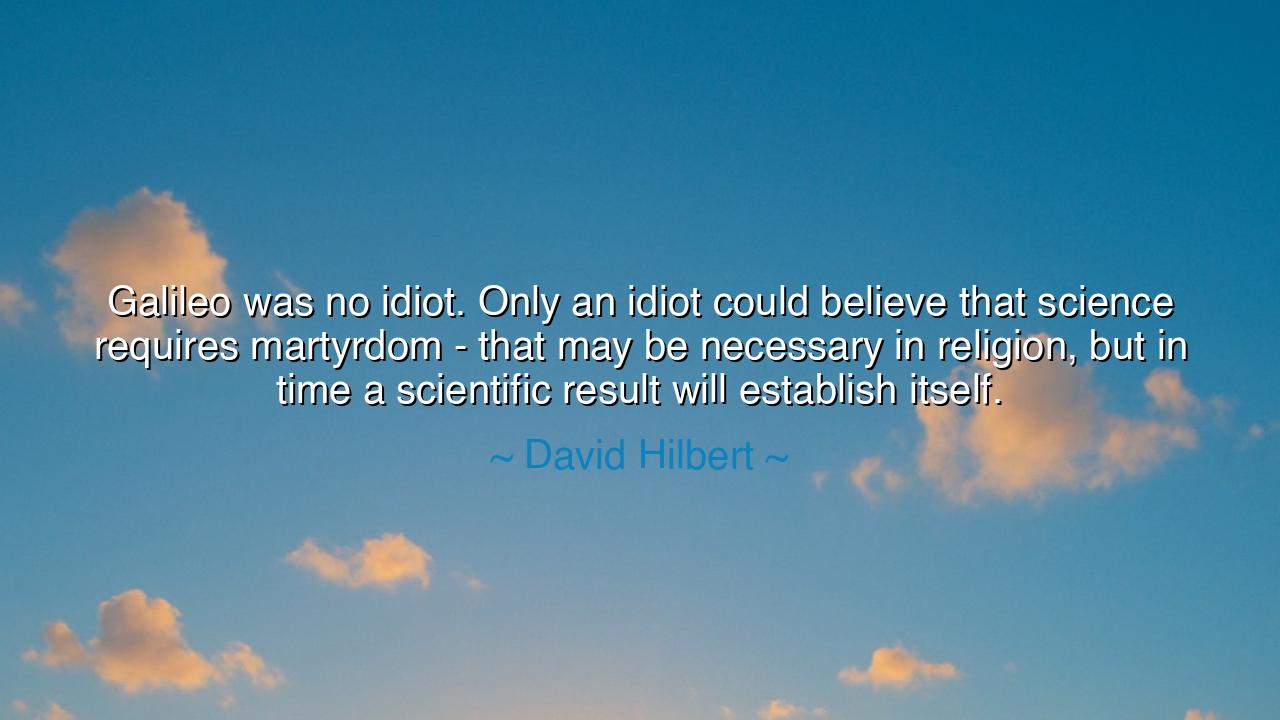
Galileo was no idiot. Only an idiot could believe that science
Galileo was no idiot. Only an idiot could believe that science requires martyrdom - that may be necessary in religion, but in time a scientific result will establish itself.






"Galileo was no idiot. Only an idiot could believe that science requires martyrdom—that may be necessary in religion, but in time a scientific result will establish itself." These words from the brilliant mathematician David Hilbert reveal a profound understanding of the nature of science and truth. In them, Hilbert refutes the idea that scientific progress requires sacrifice in the way that religious martyrdom might. To him, science is a pursuit of knowledge that, though it may face opposition, does not need to rely on the martyrdom of its proponents. In time, the truths of science will establish themselves, for they are grounded in reason, evidence, and observation, not in faith or dogma.
The story of Galileo Galilei, the Italian polymath, is one of the most poignant in the history of science. Galileo, with his observations of the heavens through the telescope, discovered that the earth orbited the sun, not the other way around. This discovery was revolutionary and contrary to the teachings of the Church at the time. Despite the mounting pressure and threats of the Inquisition, Galileo stood firm in his beliefs, famously declaring, “Eppur si muove” ("And yet it moves"), acknowledging that the Earth indeed moved around the Sun, regardless of the forces that sought to suppress this truth. Galileo’s life was filled with martyrdom, but his work ultimately triumphed, and his scientific discoveries became foundational to modern astronomy.
In the ancient traditions, the idea of martyrdom was often associated with religion, where those who stood for their beliefs were willing to sacrifice their lives. Socrates, the philosopher, died for his beliefs in truth and wisdom, choosing to drink the hemlock rather than recant his teachings. Similarly, Jesus Christ is seen as the ultimate martyr, crucified for his spiritual message. However, Hilbert’s statement underscores that science does not require the same form of sacrifice. Science, grounded in empiricism and reason, progresses through the accumulation of evidence and the testing of ideas. Galileo may have faced a difficult personal journey, but the truth of his findings eventually overcame the forces of ignorance and superstition.
Hilbert’s critique is also a call to recognize that science, unlike religion, does not depend on the faith of its followers to establish its truths. Scientific results are not based on the assertion of belief but on reproducible evidence. The work of Isaac Newton, for example, in formulating the laws of motion and gravitation, did not require his followers to die for these truths, but instead, to test them, observe the world, and build upon them. Newton’s laws established themselves not through religious conviction but through the force of their practical applications in the world, which could be observed and verified.
This idea that science establishes its own truths over time is exemplified by the scientific method—a process of observation, hypothesis, experiment, and conclusion. In this way, the work of scientists is always open to correction and refinement, but it does not depend on the martyrdom of those who champion it. Over time, the truths of science gain acceptance not through coercion or suffering, but through the convincing power of evidence. Charles Darwin’s theory of evolution by natural selection faced tremendous opposition in his time, yet today, it stands as one of the most established principles in biology, not because Darwin was a martyr but because the evidence for evolution is overwhelming.
The lesson we can take from Hilbert’s reflection is that science, while it may face opposition, does not require sacrifice for its progress. The truths that science uncovers are grounded in the natural world and will eventually establish themselves through reason and evidence. We are called, not to sacrifice ourselves, but to persevere in our pursuit of knowledge, to remain steadfast in the face of doubt, and to embrace the process of inquiry with humility and courage. As Galileo did, we must hold firm in the pursuit of truth, knowing that time, evidence, and reason will be the ultimate judges of our ideas.
In our own lives, we must understand that the pursuit of truth—whether in science, philosophy, or human endeavor—requires resilience, but not necessarily sacrifice. It demands that we question the world, test our ideas, and be open to change. The world is constantly evolving, and we, too, must evolve in our understanding. Like the great minds of history, we must stand firm in our convictions, but do so with the knowledge that the truths we seek will, in time, establish themselves. Let us follow the example of those who, through reason and evidence, have shaped the world for the better, and let us continue the journey toward greater understanding and wisdom.






AAdministratorAdministrator
Welcome, honored guests. Please leave a comment, we will respond soon